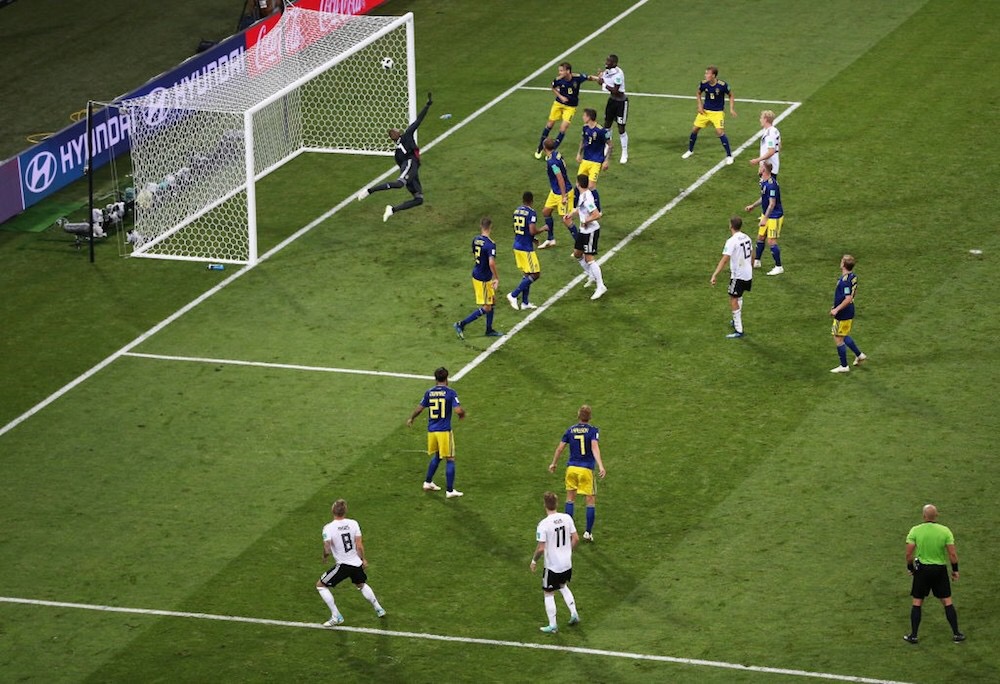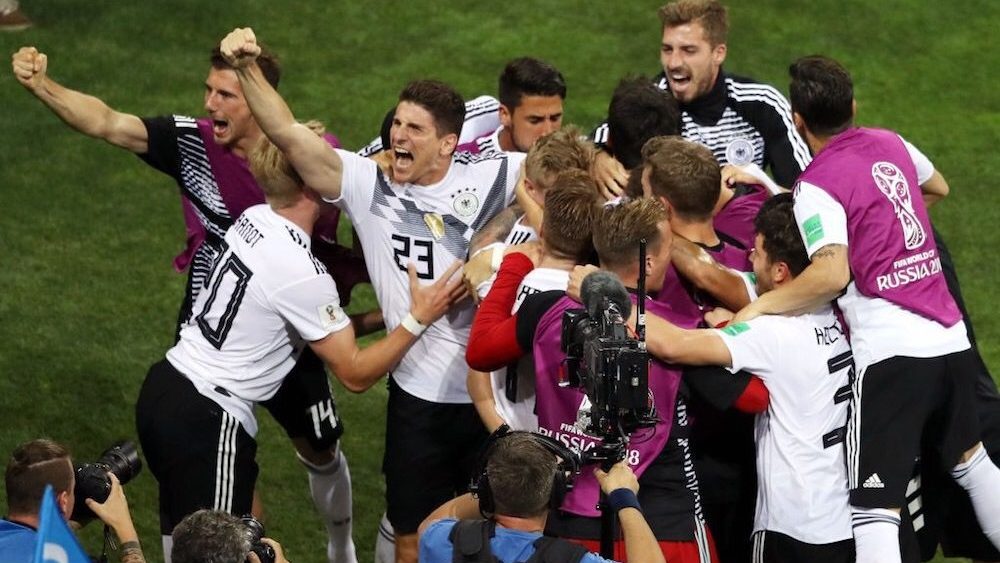World Cup-Blog: tactics, dreams, Toni Kroos
It was early in the meeting with Sweden. Germany stood already with their backs to the wall – like Italy 2010, like Spain 2014.
With the knowledge of the past it would have been no surprise if the Germans had been quivering from the start. But they didn’t. After just a few seconds, the first good chance came for the world champions.
After around 20 minutes, what Löw’s team brought onto the pitch actually looked really good. Rüdiger did indeed treat himself to an early catastrophic howler, but Boateng and Neuer saved their team – even if they were also somewhat lucky, since a penalty would have been fair.
Before that, though, the Germans had carved out big opportunities. For example, after Kimmich played Reus in inside the penalty area with a fantastic ball.
After those 20 minutes, things suddenly fell to pieces. Rudy went down injured and even at the end of the strong opening phase it was visible what was going through the world champions’ heads.
They knew of their vulnerability. At the latest after the goal that put Sweden ahead, unfortunately assisted somewhat by Toni Kroos, the scenarios for an early exit were more realistic than ever before.
The team escaped into the break, but there they were confronted with a huge challenge. The first time in history the possibility existed that a German team would be knocked out in the first round. The pressure was enormous.
Supposed leaders like Müller and Kroos found themselves out of the game around the end of the first half, even making fatal errors.
What happened in the second period, however, brings hope for the coming weeks.
Three things we noticed
1. Leaders
It may seem excessive after this start to the tournament, but this team is full of leaders.
How Kimmich at just 23 years old pushed his team forward from the start. How Kroos didn’t tire after his two fatal misplaced passes, controlling the build-up play almost by himself and going into dribbles that were rather untypical for him. How he stroked the ball into the corner on the whistle.

WHAT. A. GOAL.
(Image: Michael Steele / Getty Images)
How Müller, in spite of a general weak performance, constantly sprinted back. How Neuer fired his team up constantly and was there in the right moments. How Gomez came in as a sub and took on responsibility. How Özil and Khedira showed after and during the game that they can deal with tough decisions against them.
How Boateng led every attack vertically and became more and more a defensive midfielder and a central midfielder. How Reus marched and Werner demanded every pass.
All of these players can be reproached for something. Whether it’s their technical performance or tactical nature. But one thing can’t be said: that these boys don’t take on any responsibility.
The pressure was enormous on Saturday evening. Maybe higher than ever in Löw’s era. There was also a lot of luck involved in the team passing this test.
But they passed it, and never gave up in doing so. Not after Boateng’s sending off either. This time, nobody fell apart.
And whoever looked carefully at the celebrations saw that the leader debate is pointless. This team isn’t lacking in characters. It’s lacking elsewhere.
2. Unfitting roles in the 4-2-3-1
Löw made four changes to his side to add some impetus. Rüdiger, Rudy, Reus, and Hector came in for the injured Hummels, and for Khedira, Özil, and Plattenhardt.
By all means a decision that was largely understandable. Particularly the decision to go for Rudy gave a few fans cause for despair, but it was to turn out to be spot on in the opening phases.
Kroos is perhaps being targeted at this tournament perhaps more than at any other before. It’s even more important, then, to have somebody next to him who can take on responsibility in the build-up.
Only having Boateng against Mexico wasn’t enough. Rudy understand very well on Saturday evening how to help Kroos in tight situations and to take on responsibility himself in the build-up. At the same time he backed up Kimmich well. That led to more security and clearly better ball circulation.
When Rudy had to go off injured, it was clear to see why Gündogan is currently not an option. He was consistently 10-15 metres too high and was no longer any help to Kroos.
Kroos had no reason to play that complicated pass for the conceded goal, but Gündogan had a part to play too. Instead of offering himself he turned away and as a result wasn’t ready. He doesn’t bear the main responsibility, but the scene was symptomatic of the game.
Gündogan barely trusted himself to do anything, which could also have something to do with the discussion around his character. Löw’s decision to pick Rudy, then, was even more correct. If he isn’t able to play against South Korea, Goretzka would also be an alternative.
Unburdening Toni Kroos must be the priority at any rate. The first 20 minutes showed that clearly. In addition, the period after Boateng’s sending off was also emblematic. Rüdiger, after his mistake, wasn’t able to play a single pass forward or to take any risks.
Without Boateng that was exceptionally problematic, because the verticality vanished. A lot will depend on Boateng and Hummels in the coming weeks.
Up front, Müller remains a problem. The Bayern attacker was better at the start, but got worse as the game went on. In spite of a great willingness to run, not much came off for him.
Progress from Mexico was, however, was visible when he was able to move free and overloaded areas.
Löw, in spite of that, has a problem: if he can’t guarantee Müller his free-spirit role, he has to consider whether he picks somebody else.
Müller is at his strongest when he has a technically strong and clinical striker (Lewandowski at Bayern) and a playmaker (James at Bayern) on his side.
For the DFB, that could be Werner and Özil. The latter was lacking when he had to take on a playmaking role himself far too often. Reus is also rather more the kind of player that makes runs behind the defence, instead of creating situations with passes himself.
One possibility would be to bring Özil back in for Draxler, pushing Reus onto the left and letting Müller play everywhere.
One of Germany’s big deficits is precisely that they don’t occupy zone 14, the classic number 10 zone, much. A technically strong passer is lacking there, which Özil can be. Against Sweden the Germans were too often standing on the final line of defence, but not enough in between the lines of the opposition.
In the first half there were, however, still situations in which Müller, Reus, Draxler, and Werner were all playing on the left. These overloads directly created good chances. They finally differed from Plan A, offering variability that also reflected well on Müller.
On the other hand, the cooperation between the world champion and Timo Werner isn’t working brilliantly yet. The RB-Leipzig striker has so far been too technically limited and can do little with Müller’s runs, because he also quite likes to be evasive from time to time. Löw will have to decide: either highlight Müller’s strengths or leave him out. The question also remains as to whether the 4-2-3-1 fits the players perfectly. So far the answers seems to be more no than yes.
3. Ignition? The dream is alive!
Nonetheless, the team showed the expected reaction. They did more than that, even.
Yes, the period before half-time was unnecessary. Yes, the final phase wasn’t urgent enough and Löw could also have reacted earlier, perhaps should have.
But the whole dramatic composition and the fact that the pressure was so high showed that this team can still achieve great things. Body language, support, backwards movement, aggression and willingness were all clearly improved.
Even the setback didn’t lead to the whole game tipping. In the interim it looked as if the world champions’ psyche wasn’t stable enough. In the second half, though, Boateng (until his dismissal), Neuer, and also Kroos led the way. They took on responsibility, increased the pressure on an ever-more nervous Sweden and won this important game with a scrap of luck.
It wasn’t a five-star performance, but a showing of strength. Kroos is completely right when he talks about balls, which he and his team demonstrated in a complicated second half.
It’s also a fact, though, that after this performance of sheer will the tactical deficits must be worked on. Perhaps with a change of system. Boateng in particular will be a miss for the Germans in the first final of the World Cup.
It’s still alive, the dream of defending the title. And with all the criticism it’s important to stress the reaction, not to be taken for granted, and the performance of sheer will against Sweden.
You are currently viewing a placeholder content from X. To access the actual content, click the button below. Please note that doing so will share data with third-party providers.





